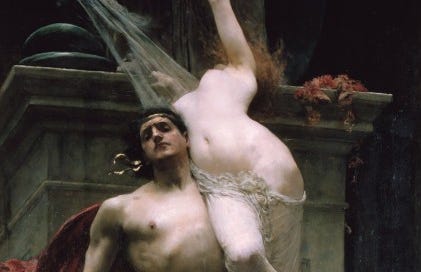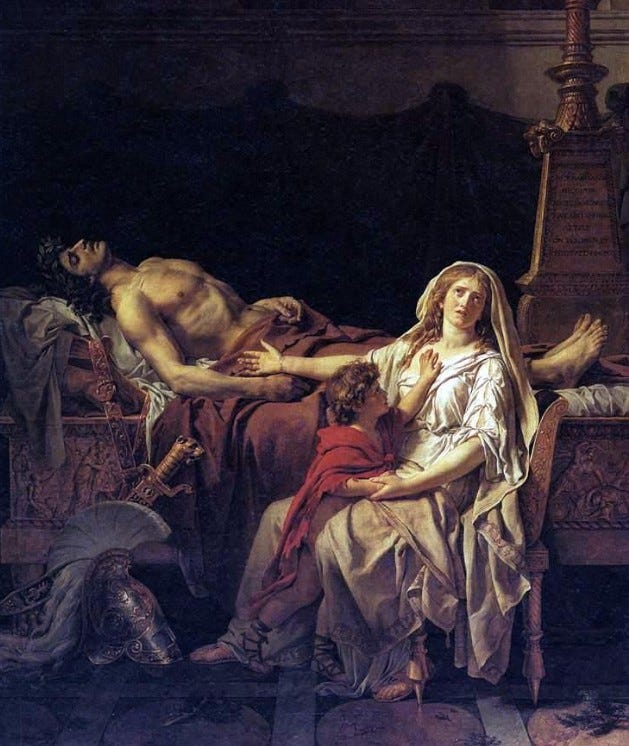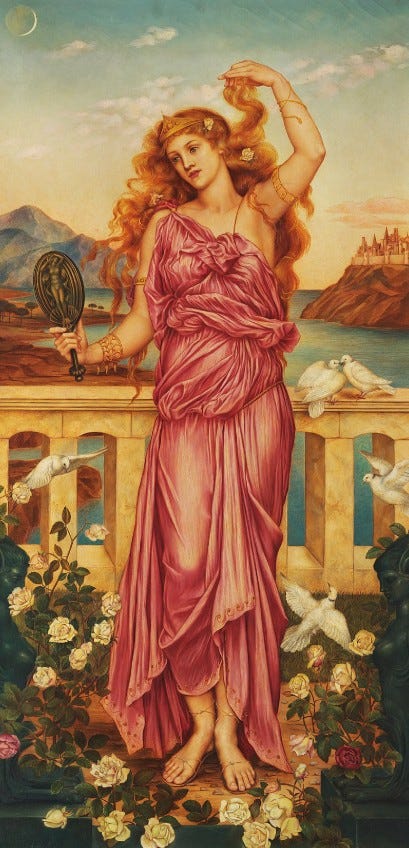“This was the work of the Virgin, of Athena. There was slaughter of the Trojans at the altars, there was decapitation in the bedrooms – desolation to win for Greece the prize of girls to bear them children. And for us Trojans, nothing but pain.”
Euripides’ plays on Troy expose some of the realities of femininity, focusing on the essential difference in how men and women experience war. The titular play illustrates the fate of Trojan women after their men have perished and their city is a smoking ruin. At the center of the play is Hecuba, the broken queen of a burning kingdom. One at a time she encounters the key women of Troy – Cassandra, Andromache, Helen – offering us a multifaceted view into what defeat in war means to womanhood.
New life
Modernity tends to depict women as brave soldiers and warrior princesses. The Greeks too had their fantasies about Amazon warrioresses. But Euripides holds no illusions and is willing to offer us none. He shows us the reality beneath the fantasy: women as the prime spoils of war. The Trojan Women describes the process where all the fairest of Troy are divvied up to the Greek generals as wives and concubines. Their destiny is to bear sons to the killers of their fathers, brothers and husbands.
“Scamander shrieks with wailing women captured at spear-point, to be allocated masters. Those Trojan women not yet dealt wait in the tents, reserved for the top generals. With them is Spartan Helen, correctly classified a prize of war.”
As a kind of female equivalent of Job, Hecuba cries out in desperation at her burning home, murdered husband, dead sons and despoiled daughters. She laments for the girls of Troy, to be made the wives of foreigners.
“Ah we poor wives of those Trojan warriors, whose bronze spears could not save us. Poor girls, what terrible weddings for you! Troy is smoking, slowly burning, we are crying.”
These scenes depict the reality of a lost war and its vastly different significance to the two sexes. For the men it means death. For the women it means a new life beside new men, as the old men could not protect the old way of life.
Euripides approaches the drama with stark psychological insight. He shows us the women’s initial, grief-filled reaction, represented by the chorus:
“I will never see my parents’ home again. This is the last time, this is the end. And worse to come: I’ll either be forced to bed with a Greek – curse upon that night, that destiny! – or else I’ll be just a poor household slave.”
But quickly their tone begins to shift towards stirring expectations of future happiness.
“I hope I go to the famous happy land of Theseus: Attica. I’ve heard about the holy river-valley, under Mount Olympus. They say it’s thick with weighed with fertile harvests. That’s my second choice of country, first Athens. And another land lies near the Ioinian Sea, which the beautiful river Crathis nourishes, and makes the country rich and happy in its men.”
This begins to sound almost like they are going on holiday with a new boyfriend. One moment they mourned and scorned, the next they are already beginning to smile and to utter powerfully suggestive words like “fertile” and “happy in its men”. This is how Euripides illustrates the shocking pliancy and pragmatism of women.
For a man such a thing would be unthinkable. Instead of bending he must break – as indeed the Trojan men have, skewered by the spears of their enemies. But the nature of women is not to stop there and let life end where their city is a smoking ruin and their husbands are no more. For men war is absolute, you win or you are vanquished. Not so for womanhood. For them war offers new prospects: new wifedom, new motherhood.
However, not all women are depicted so flexible. Cassandra, a daughter of Priam and princess of Troy, has committed her life to chastity as a priestess of Apollo. But now she is given to Agamemnon, who has become infatuated by her beauty. Hecuba asks a messenger:
“My child, my poor daughter, who’ll get her? Tell me, who’ll get Cassandra?”
– King Agamemnon got her as his prize.
Oh no! To make her slave as a slave to that Spartan wife?
– No, to be his secret second wife.
But she’s a virgin of Apollo! Chastity was given to her as a prize, by the god with the golden hair!
– Passion pierced the king for the god-struck girl. But isn’t this great? The bed of a king is hers.”
The messenger sees Cassandra’s fate as enviable – from a hopeless daughter of a dead kingdom to the secret wife of the greatest king of Greece. All the while her brothers lie in their graves. Initially the mad (or playing mad) Cassandra appears to enthusiastically share the optimism of the other women. But in fact the vision she sees in her upcoming marriage is considerably darker than the dreams of happiness and fertility suggested by the other girls:
“What a joy for me, my wedding day! My royal Argive wedding! Come, girls of Troy, in your prettiest dresses, sing for my wedding! Sing for the husband destined to share my bed! Mother, I have won the prize! Be happy! I am marrying the king! Send me to him: or, if I hesitate, push me to him.
If my prophetic god tells true, this famous Greek king, Agamemnon will have worse luck in his affair with me than Helen had. I’ll kill him, sack his home, revenge for my dead brothers and dead father. I shall destroy my enemy, and yours, by marrying him.”
Cassandra too plans to make use of this new life offered to the women of the defeated, albeit in a grim, destructive way. She is excited about marriage, yet not as a way to bring forth life but to destroy it.
‘Hector my defender’
In the play the name of Hector represents Troy’s broken manhood. In a touching scene, Hector’s widow Andromache talks to Hecuba, trying to find consolation and protection in a man long since dead.
“Come back to me, husband!
- Poor girl, you’re calling a man who’s in Hades. My son is dead.
Hector, you’re my defender, and to the Greeks you’re ruin. How I long to die!
- Poor girl, this is what we suffer.
Gone is our city.
Pain heaps onto pain.”
With glorious Hector no longer there to defend her, it is the fate of Andromache as well to become the wife of a former enemy. In her case the tragedy is heightened further: she is to be the prize of Neoptolemus, the son of Achilles – her husband’s killer.
Andromache represents ideal womanhood in the play. She is the best exemplar of the three highest virtues of women: she is chaste, she is submissive, she is loyal. The reality that awaits her causes the virtuous widow great anguish.
“In Hector’s house I worked at all the things considered right and proper for a woman. First, I stayed in the house and put aside desire to leave and go elsewhere. Most scandals happen when girls leave the home. My tongue was silent and my eyes were calm with Hector. I knew when to conquer him, and when I ought to to yield and let him win.
When I was captured, Achilles’ son desired me for his wife. If I push darling Hector from my heart and roll it open to my present husband, I will betray the dead. They say a woman’s dislike for a man will soften after just one night in bed. But I spit on the wife who throws away her former man and loves her new bed-partner.”
Despite her admirable spirit of loyalty, in another play by Euripides, titled simply Andromache, we are shown that she ultimately becomes the equally chaste, submissive, loyal wife of Neoptolemus, bearing him a son. Andromache is then grievously envied by her new husband’s lawful wife Hermione, as Neoptolemus adores the prize-wife more than the lawful wife. Andromache reveals to her rival the secret of love: it is not just beauty that wins a man’s affection, but kindness and goodness.
Despite the defiance depicted above, Andromache will be as kind and good to Neoptolemus as she was to Hector. We are shown how the ideal woman makes an ideal wife, even for a former enemy.
Hecuba dislikes the words of defiance coming from Andromache, perhaps assessing that they go against the nature of womanhood, and at the same time hoping that by letting go of vanquished Hector, Andromache will be able to bring forth new life and new hope.
“Darling daughter, no more of Hector. You can’t save him with tears. He’s dead. Let be. Be submissive to your present husband. Behave so charmingly the man will love you. If you do this, you’ll make your people happy, and raise my grandson to be Troy’s greatest hope.”
The face that launched a thousand ships
The impenetrable mystery at the core of the Iliad and much of Greek literature is Helen of Troy. If Andromache represented the qualities of the ideal wife, Helen represents, first of all, the infinite beauty and charm of womanhood. But equally she symbolizes the eternal mysteriousness of femininity: the fickleness, the changeability, the opaqueness. Is she an adulteress? Is she the victim of rape? Did she leave willingly? Was she kidnapped? Was she charmed by the gods? All of the above?
Homer’s depiction is ambivalent, leaving the mystery unsolved, but in the Trojan Women and in most of the dramatic tradition the simple answer is that Helen is a strumpet. She betrayed her husband by accepting Paris’ proposal, and thus caused the vows of the Kings of Greece to be enacted, launching the war against Troy. The beauty and fickleness of a woman destroyed the kingdom and caused a decade long bloodbath.
Menelaus is the only great king of Greece that we meet in the play. He plans to drag deceitful Helen back to Sparta and let her be killed by the people. Besides signifying a personal venting of frustration for adultery, Menelaus’ plan signifies a national venting of frustration for all the men lost in the war – and of course the traditional fate of women who fraternize with the enemy.
“I have come to get Miss Sparta: I won’t say the name – my former wife. She’s in detention here with the Trojan girls, the prisoners. I will take her back by ship to Hellas, let them kill her there, as retribution for those lost at Troy. Get her from the tent! Drag that woman here, bring her to me by her blood-guilty hair!”
Hecuba warns Menelaus of the charms of womanhood, convinced that if he takes Helen alive, she will soften his heart on the way back home.
“Menelaus, I approve your plan to kill your wife. But flee her hellish sight! She’ll trap you with desire. She traps men’s eyes, ruins cities, burns up homes: she has such charms!”
Helen is brought forth (presumably by the hair) and she beseeches Menelaus to allow her to explain herself. She is revealed to be most excellent at avoiding accountability and at playing the victim, both perennial dark traits of the feminine.
Helen begins by blaming Hecuba for giving birth to Paris. Second, she blames Priam for failing to kill the infant after hearing the prophecy that Paris would burn Troy. Then she blames Paris himself for choosing Aphrodite as the fairest goddess. She blames Menelaus for being so foolish as to leave Helen alone. She goes on to say how the war had actually only benefited Greece, while caused herself only harm – how she was the victim here.
“Sold for my beauty, loathed by those who should have blessed and crowned my head.”
She explains her behavior was due to having been charmed by the divine powers of Aphrodite, which made her unaccountable of her actions. And she rests her case by blaming father Zeus himself for not reining in his daughter!
Hecuba has no patience for any of this.
“Don’t make gods seem fools, to prettify your faults; you won’t persuade the wise. You said Aphrodite went with my son to Menelaus’ house. Ridiculous! No, no. My son was very handsome. Glimpsing him in his gold, your mind caused your desire.
You hoped to trade your Sparta for our city, our Troy which flows with gold. Already you’d run riot living it up in Menelaus’ palace. But still you wanted more.”
We are told how skilled Helen was at manipulating her new husband, in turns emasculating him and sweetening him up whenever it benefited her. When the war was going badly for Troy, Helen would sing the praises of Menelaus to upset Paris by comparing him to his sexual rival. But when Troy was doing well, Menelaus was as nothing and Paris was the apple of her eye.
Hecuba had urged her to leave the city and go to the Greeks, thus ending the war and stopping the killing. But Helen didn’t want to. She desired the life of a princess in the palace, with foreigners prostrating themselves before her.
“You were always acting with an eye to fortune, never virtue. After such behavior, you come out here dolled up, and dare to share the sky your husband sees? Disgusting monster! You are shameless!
Menelaus, here’s my final word: crown Greece with glory, glorify yourself, by killing her. So set the rule for others: a woman who betrays her man must die.”
But the mysteries of Helen don’t end here. Despite the hard words of Hecuba, we know from the events of the Odyssey that one way or another Menelaus is indeed softened and he ends up living in Sparta with his dear Helen. The Greeks themselves never quite solved this riddle. Perhaps Helen indeed worked her charms on Menelaus on the way back, as Hecuba feared would happen?
A more imaginative explanation is offered in another play by Euripides, Helen. There we are told that the Helen at Troy was not a real person at all, but an eidolon fashioned by the goddess Hera. The real, chaste, loyal Helen had been hidden in the Egypt, where Menelaus later finds her, neatly explaining how they ended up living happily ever after.
Fickleness of fate
In the Trojan Women we witness the matronly archetype in Hecuba, the virginal ideal in Cassandra, the perfect wife in Andromache, and the irresistible fickleness epitomized by Helen. Regardless, even Euripides cannot surmount the unsolvable mystery of womanhood.
But he does reveal to us something about the character of feminine tragedy. Unlike for men, for a woman defeat in war does not signify an end. Loss, yes. Hardship, yes. Trauma, yes. But whether or not the topless towers of Ilium stand or fall, the women of Troy will live on and bear fruit.
Time and again the Greek playwrights reiterate the perennial truth of human tragedy: “It is never right to call a man happy, till thou hast seen his end.” Based on what the Trojan women have shown us, the saying may be refashioned, with equal gravity: “Till thou hast seen her end, it is never right to call a woman wretched.”






